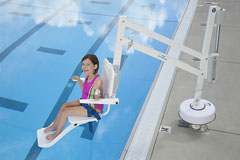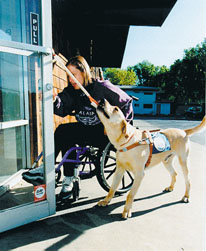The ABC's of the 2010 ADA
Just when you thought the Americans with Disabilities Act (ADA) was old hat, passé, a thing of the past, or a checked box on your business to-do list, the 20-year old law has had significant revisions as of 2010. It These new minimum requirements, which will go into effect March 15, 2012, will affect more than 7 million businesses. All businesses that serve the public must provide equal opportunity for customers with disabilities. How will these changes affect you?
Lodging
The new regulations, for the most part, mandate a higher level of accessibility than previous versions. Hotels are now required to provide more accessible rooms with specific dimensions and guidelines for disabled guests. The regulations now cover exercise rooms, golf courses, saunas and steam rooms. They require increased access to guest amenities such as swimming pools and fitness rooms. Common use work areas, such as employee rooms, dining areas, and kitchens, must now be ADA compliant.
Improved Access
A.The 2010 standards are similar to the current standards but not identical. In some cases, the new standards require a greater degree of accessibility. For example, portable visible alarms will not be allowed in guest rooms requiring communication features, and new requirements for toilet and bathing facilities will result in larger bathrooms.
B. Since most hotel guest rooms use voicemail messaging systems for receiving and directing incoming telephone calls, owners and operators will have to provide effective real-time communication with customers who are deaf or have speech disabilities who use auxiliary aids and services, including text telephones (TTYs).
Reservations
A. Lodging facilities are required to allow individuals with disabilities to make reservations for accessible guest rooms during the same hours and in the same manner as other guests.
B. Reservations staff (of a hotel or a third party) will be required to identify accessible features in guest rooms (e.g. guest room door widths and availability of roll-in showers) and other hotel amenities in sufficient detail so that an individual with a disability can make an independent assessment whether the hotel meets his or her accessibility needs.
C. Regulations require hotels and other places of public lodging hold accessible rooms until all other rooms have been booked. In addition, accessible rooms can no longer be double-booked by hotel staff. Hotel reservation systems must identify accessible features of the rooms, and hotel features not accessible to those with disabilities. This way, disabled guests can make informed decisions when choosing accommodations.
More detailed information.....
New Standards For Hotel Swimming Pools & Exercise Rooms
The revised ADA 2010 Standards contain new requirements for elements in existing facilities that were not addressed in the original 1991 Standards. These include recreation facilities such as swimming pools, wading pools, spas, play areas, and exercise machines.
A. If for example a hotel has a pool that is inaccessible, and it does not undergo any alterations after March 15, 2012, the operator of the pool still has an obligation to investigate if it is “readily achievable” to remove the barriers to access at the pool and provide access by installing a pool lift, transfer steps, etc. The evaluation of what is readily achievable, once again, will vary depending on a number of factors including the financial resources of the place of public accommodation.
B. A physical change to a swimming pool that affects or could affect the usability of the pool is considered to be an alteration. Changes to the mechanical and electrical systems, such as filtration and chlorination systems, are not alterations.
C. When pools are altered and made accessible, there are several options that may be used to provide access into the water, including pool lifts, sloped entries, transfer walls, transfer steps and pool stairs. Large pools (any pool with over 300 linear feet of pool wall) must have a minimum of two accessible means of entry. The primary means of entry must be either a sloped entry into the water or a pool lift that is capable of being independently operated by a person with a disability. The secondary means of entry could be a pool lift, sloped entry, transfer wall, transfer system, or pool stairs. It is recommended that where two means of entry are provided, they be different types and be situated on different pool walls. Pools with less than 300 linear feet of pool wall are only required to provide one accessible means of entry, which must be either a pool lift or sloped entry.
More detailed information.....
Conference And Meeting Facilities
A. Hotels with conference and presentation rooms should look at the ADA regulations for theaters to ensure equal access to all patrons.
B. This means guests should have access and information regarding available auxiliary aids such as captioning, state relay services instead of a TTY, etc. The regulations now include video remote interpreting (VRI).
C. Employees should be trained in the use of auxiliary aids. If you use an outside vendor for audio/visual service, make sure the contract specifies responsibility for supplying auxiliary aids.
Changes To Crib Standards
A. The federal government recently announced a ban on drop-side cribs and updated the crib standards. Hotels have a two-year window to replace their current cribs with compliant models.
B. Crib suppliers are currently engineering compliant cribs, and hope to have the new models available this year. Hotels should immediately begin replacing old cribs with the new models to lock in prices.
C. As you replace old cribs, ask for certificates of compliance to ensure you are meeting the new regulations.
Assistance Dogs
A. Previous regulations did not specify what types of animals qualified as a service animal. The new regulations define a service animal specifically as a DOG trained to perform tasks that mitigate the effects of a disability, such as picking up an item.
B. However, trained miniature horses as alternative to dogs are permitted under certain conditions with size, type, weight, handler control ability, and if the horse is housebroken as major assessment factors. Another consideration is whether the miniature horse compromises legitimate safety requirements for safe operation in a specific facility,
Hooray! No more signal parrots, comfort snakes, or therapy iguanas.
B. The new regulations are specifically state that emotional support animals are not “service animals,” but psychiatric service animals trained to remind its handler to take medicine, to provide safety checks, or room searches, for individuals with post-traumatic stress disorder, and/or to stop its handler from harming him- or herself are service animals.
C. You should never ask a person with a service dog about the nature of his or her disability, but you may ask if the animal is a service animal. If your business in California, you should also be aware that state law requires businesses to grant access to service animals in training with a qualified trainer, regardless of whether that person has a disability.
Mobility Devices
The new 2010 regulations clarify a business’ obligation to accommodate mobility devices such as wheelchairs and other power driven mobility devices (OPDMD's). OPDMD's are mobility devices not designed for persons with disabilities, but are used by them, such as the Segway.
Under the new regulations, wheelchairs must be permitted in ALL areas open to pedestrian use. OPDMD's must also be permitted, unless the owner can demonstrate that the use of such devices would fundamentally alter the business owner’s programs, services or activities, create a direct threat, or would create a safety hazard.
Don't Forget To Train Your Staff
A critical and often overlooked component of ensuring success is comprehensive and ongoing staff training. You may have established good policies, but if front line staff are not aware of them or do not know how to implement them, problems can arise. Businesses of all sizes should educate staff about the ADA's requirements. Staff need to understand the requirements on modifying policies and practices, communicating with and assisting customers, and accepting calls placed through the relay system.
Think Ahead
Being proactive is the best way to ensure ADA compliance. Evaluate access at your facility, train your staff on the ADA's requirements, think about the ADA when planning an alteration or construction of a new facility, and, most importantly, use the free information resources available whenever you have a question.
Centers for Independent Living National Directory



